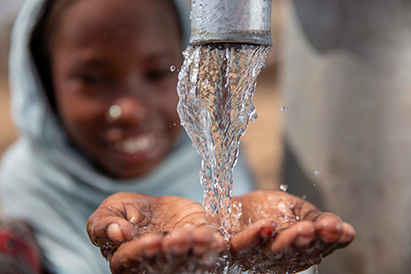
Raised:
£44.45 millionGoal:
£500.00Clean Water
Providing Clean Water for All
More than 2 billion people lack access to a safe water source, and clean water is essential for drinking and sanitation. Without it, people face the risk of disease and even death.
Limited Access to Safe Water
Among the countries where citizens struggle to secure reliable and clean water sources, Eritrea has the lowest access. Over 80% of the population in this East African country lacks adequate water sources. With no household sanitation and open water sources, the water they can access is contaminated with potentially life-threatening bacteria.
Papua New Guinea also faces significant water access challenges, with nearly 64% of its residents lacking clean water access. Due to the population’s distribution across hundreds of islands, coordinating water and sanitation services for communities is challenging. The prevalence of inappropriate hygiene practices further complicates matters. For Papua New Guinea, frequent natural disasters like cyclones and floods exacerbate their already limited access to clean water.
In Uganda, over 60% of people lack the necessary water and sanitation access to safely consume and use water. Other countries with critically low access to water include Chad, Ethiopia, Sierra Leone, Laos, and Nepal.
Water is Life-Sustaining
Water is indispensable for numerous aspects of life.
Disease Prevention
Clean and safe water is crucial for a healthy life. Drinking from contaminated water sources puts people at risk of dangerous diseases such as cholera, typhoid, diarrhea, and dysentery. In developing communities, these illnesses often prove fatal. Clean drinking water plays a vital role in preventing these diseases.
Hygiene and Sanitation
The ability to wash hands and access sanitary bathroom facilities is often underestimated. However, it’s a major factor in disease prevention and reduced fatalities. Inadequate handwashing or using contaminated water for bathing can lead to the spread of germs and infections. Proper sanitation facilities also reduce contamination and germ transmission.
Agriculture and Farming
Reliable access to water enables villages and communities to become more self-sufficient through agriculture. Using contaminated water can spread bacteria to crops, affecting both yield and crop safety. Livestock health also depends on reliable access to water.
Improving access to clean water and sanitation methods can address many daily challenges. The impact extends beyond health and hygiene, fostering increased equality, enhancing educational opportunities for girls, reducing healthcare costs, and freeing up time spent on daily chores.
Dangers of Using Contaminated Water
Clean water is essential every day, but its significance becomes even more evident during disasters or emergencies. Droughts, conflicts, natural disasters, famines, wars, and disease outbreaks emphasize the critical need for safe water in developing countries.
On a daily basis, drinking or using contaminated water can lead to various diseases, exacerbate malnutrition, and stunt children’s growth. Waterborne diseases like cholera claim tens of thousands of lives annually, with a 55% fatality rate if left untreated. Nations lacking clean water also often lack adequate healthcare facilities, compounding the challenge for rural communities.
Diarrhea, another common waterborne illness, is one of the leading causes of death for children under five. People around the world lose their lives daily due to unsafe water.
The Dangers of Water Scarcity
Water is essential for survival, playing a key role in bodily functions. Our bodies are composed of roughly 60% water. Proper hydration is critical for functions such as waste removal, blood circulation, temperature regulation, nutrient absorption, and brain function. In regions with high temperatures, maintaining hydration is even more crucial to replenish fluids lost through sweat.
Improving Access in Developing Regions
Implementing water and sanitation infrastructure is just one part of the solution in many underdeveloped areas. Many people in these communities lack awareness of or have never been introduced to the importance of hygiene and sanitary practices. Education and outreach are essential in conjunction with improving access to clean water. Handwashing, bathing, proper toileting, and other hygiene practices using clean water can significantly improve community health and safety. Residents must be aware that these habits are essential for their well-being.
Nova Foundation’s Commitment
At Nova Foundation, we understand the importance of providing clean water to developing nations. Education and training are equally crucial to empower communities to become self-sufficient and manage their water supply systems autonomously. Access to clean water is vital for the survival and prosperity of villages, towns, households, and individuals. Nova Foundation aims to help these communities not just survive but thrive independently.
Clean water enables people to consume and use their supplies safely, cultivate crops, raise livestock, and implement sanitation practices that promote community health. Everyone should have the opportunity to enjoy these benefits, and we are dedicated to making it a reality. Currently, our focus is on arid regions worldwide, including Africa, India, and Pakistan.



